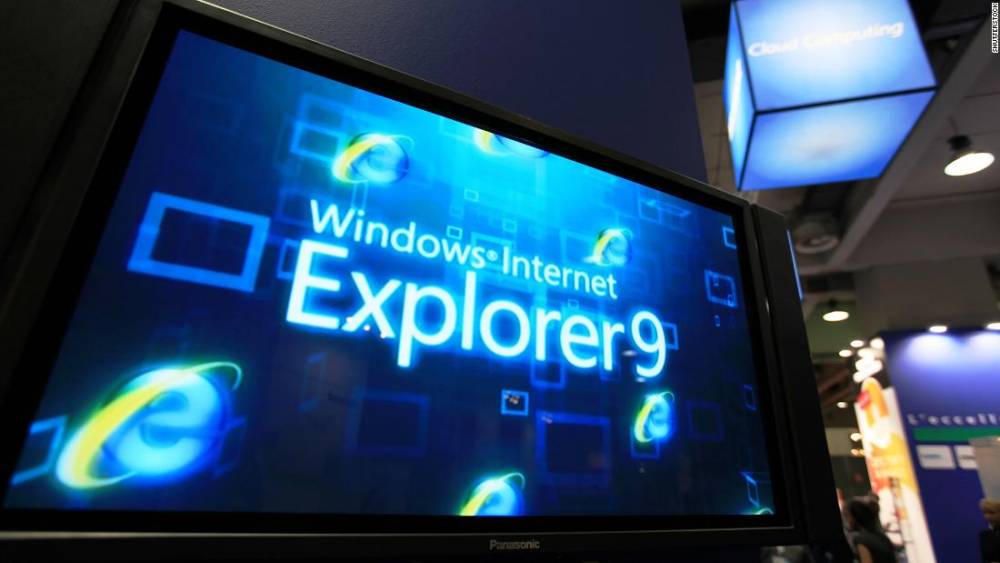
Microsoft is finally getting rid of its most-hated product
Microsoft is finally getting rid of its most-hated product
Internet Explorer's demise is finally near for one of Microsoft's most reviled products that refused to die.
Microsoft announced this week that Internet Explorer 11 support will end on June 15, 2022. After years of flirting with IE's demise, the final nail in the coffin was driven.
For instance, Microsoft abandoned Internet Explorer in August 2020 in favor of its own products. Teams, Microsoft's workplace chat software, stopped working with Internet Explorer last fall, and its 365 apps (including Office) will stop working with IE by mid-summer 2021.
Internet Explorer, once the most popular web browser, had been steadily declining in popularity for nearly two decades. According to browser usage tracker NetMarketShare, its share of the browser market fell below the 50% mark in 2010 and is now around 5%. Google's (GOOGL) Chrome browser is the market leader, with a 69 percent market share.
Microsoft stated in its death announcement that Internet Explorer is too slow, is incompatible with many modern web tasks, and is far less secure than modern browsers.
Nonetheless, IE has miraculously survived for 26 years. Microsoft has continued to include Internet Explorer with Windows to ensure that corporate applications continue to function properly. Corporations are notoriously slow to adopt new browser versions, even more so when custom-built applications are involved.
The majority of Windows 10 PC owners are unlikely to be aware that Internet Explorer is installed on their computers. Microsoft's modern browser, Edge, is based on Google's open source Chrome code and has gained significantly more traction in recent years than Internet Explorer.
It is unknown whether Microsoft will stop installing Internet Explorer by default on Windows PCs once the company ends support for the browser, although this is a possibility. Microsoft's latest version of the Edge browser now supports web apps built for Internet Explorer, removing the need for customers to constantly switch between browsers. Thus, Internet Explorer has long outlived its usefulness.
"We're announcing that Microsoft Edge will be the future of Internet Explorer on Windows 10," said Sean Lyndersay, Microsoft's program manager for Edge. "Microsoft Edge not only provides a faster, more secure, and more modern browsing experience than Internet Explorer, but it also addresses a critical concern: compatibility with older, legacy websites and applications."
Once a monopoly, now a distant memory
Internet Explorer made its debut in 1995 as part of Microsoft's Windows 95 operating system and immediately became a hit. It succeeded in eradicating Netscape Navigator and achieving a virtual monopoly status in the early 2000s. Internet Explorer commanded 95% of the browser market in 2002.
However, Microsoft failed to innovate, essentially abandoning Internet Explorer 6 for five years to collect dust and cobwebs. This infuriated customers and drove them away in search of greener pastures. Internet Explorer became synonymous with bugs, security vulnerabilities, and obsolete technology.
Microsoft (MSFT) finally released Internet Explorer 7 in 2006, but the damage had already been done. Microsoft laid the groundwork for Firefox and then Chrome to eclipse it.
Microsoft attempted to revitalize Internet Explorer with the release of Internet Explorer 9 in 2011. Even today, IE does not support extensions, is not available on non-Windows devices, and does not automatically sync with other devices — all of which are standard features of Chrome and Firefox.
Microsoft recognizes that Internet Explorer is not optimal for web browsing.
"IE 11 has been used by customers since 2013, when the online environment was significantly less sophisticated than it is today," the company stated last August. "Since then, open web standards and newer browsers — such as Microsoft's new Edge — have enabled more innovative and superior online experiences."
That is why Microsoft has spent the last five years attempting — unsuccessfully — to kill Internet Explorer.
In a 2014 Reddit "Ask Me Anything" session, Microsoft's Internet Explorer engineers admitted that the company was considering renaming the browser in order to "disassociate ourselves from negative perceptions" about the browser.
Rather than that, Microsoft created an entirely new browser, Edge, which was released in 2015. However, Edge did not completely replace Internet Explorer. Internet Explorer is still pre-installed alongside Edge on Windows PCs.

